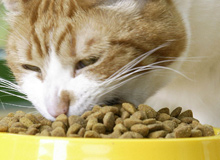In the U.S. We are bombarded with advertisements for prescription allergy relief medications. Humans with allergies get more and more options for relief every day. Does your cat have allergies? If so, you know that information about dealing with the allergies our cats have is not as readily available as it is for humans with allergies. There are some very important things to know about cat allergies.
General Cat Allergy Info
There are a lot of similarities between allergies in humans and allergies in cats. Allergies in cats are caused by the same problem that causes allergies in humans; the cat’s immune system reacts to things that are not harmful as if they were. Allergies in cats are more frequently developed by cats who are exposed to allergens to which they are sensitive. For example, cats that are allowed outdoors are more likely to develop flea or pollen allergies than cats that are kept indoors.
The 4 most common types of allergies in cats are fleas, food, contact, and inhalant. Cats with allergies may have symptoms such as itchy, runny eyes or skin, sneezing, coughing, wheezing, itchy ears or ear infections, vomiting, diarrhea, paw chewing, swollen paws, and snoring cause by an inflamed throat. It is important to note that a cat should never be given medication unless a veterinarian instructs that the medication should be given.
Flea Allergy
The most common allergy in cats is the flea allergy. It is the flea’s saliva that causes an allergic reaction in cats. One flea bite to a cat who is allergic to fleas can cause severe itching that can last weeks. With flea allergies the scratching normally occurs at the base of the neck and the base of the tail. The cat may scratch so intensely that it removes chucks of fur and tears open its own skin. The skin may appear to have areas filled with small scabs. Open wounds on the skin can lead to a secondary bacterial infection in the skin called pyoderma.
The first course of action to treat a cat with a flea allergy is to get rid of the fleas (for great suggestions click here). An important step is to take you cat to the vet and find a flea medication that will work well for your cat. Some cats will also have an allergy to flea medications. Antibiotics and salves may be necessary to treat the cat’s wounded skin.
Behavioral modification techniques may be needed if the cat has developed an obsession with scratching due to the intensity of the allergy. Be sure to keep your cat’s claws trimmed short or use plastic tips on the claws to minimize the damage the cat does when it scratches. This may also be a good time to have your veterinarian check your cat for other allergies because many cats who have developed one allergy will also develop others. The cat will continue displaying allergy symptoms until all allergens are removed.
Food Allergies
Humans aren’t the only ones that have allergies to the food they eat. Cats can develop food allergies to foods that they have eaten for a long time. Symptoms of a food allergy can include scratching of the head and neck, diarrhea, and vomiting.
To determine a food allergy, your veterinarian will require that your cat be fed an exclusive diet of hydrolyzed protein for about 12 weeks. This means no treats, no table food, no outdoor critters – just the food prescribed by the veterinarian. Even a small bit of something else could tarnish the results of the test.
Once your cat is symptom free, the cat’s usual food will reintroduced. If the symptoms return, then the cat is allergic to its usual food and the veterinarian will help you find a more suitable diet. This may mean remaining on a prescription diet or making homemade cat food.
Contact & Inhalant Allergies
Did you know that cat’s can have seasonal allergies just like humans? That’s right. Cats can develop allergies to tree pollens, grass pollens (especially Bermuda grass), and weed pollens. You might just see your kitty’s allergies flair up whenever any of these bad boys are in season. Keeping the cat indoors during these times might help to keep the cat from coming in contact with or inhaling these pollens.
You might have some other things around your house that could be causing problems for your cat. Cats are commonly allergic to mold, mildew, dust mites, perfumes, cigarette smoke, and rubber or plastic materials. Leather collars make a good replacement for rubber or plastic ones for cats who have those allergies. Dusting and vacuuming more frequently can help relieve dust allergies. Dust- free, fragrance-free litters can also be helpful. As a note, overweight cats and cats that are exposed to cigarette smoke are more likely to develop asthma than those who are of normal weight and are not exposed to cigarette smoke.
Your veterinarian may be able to prescribe some medications that will relieve your cat’s allergies. Antihistamines like Benedryl can help with some symptoms. Fatty oil supplements, certain shampoos, and sprays with natural ingredients like oatmeal or aloe can help with dry itchy skin. Allergy shots can also be helpful in treating the allergy itself. However, allergy shots can be expensive, take several months to show results, and 25% of cats that receive them do not respond to the treatment.
 Now that you’ve eaten your fill, play a game with Playful Kitty!
Now that you’ve eaten your fill, play a game with Playful Kitty!





















